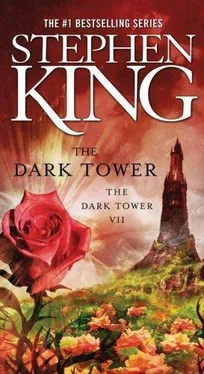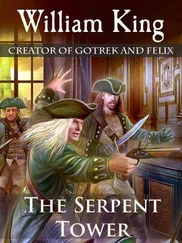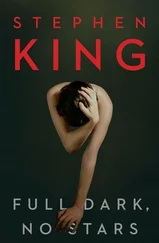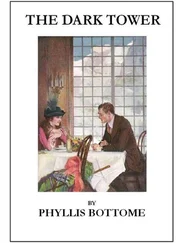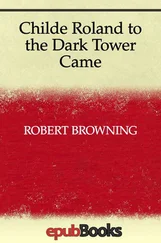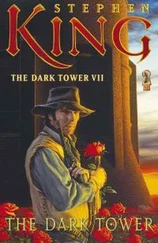“Why?” Susannah asked as she watched the last few wisps of smoke dissipate. “Why?”
“Are you surprised, Susannah of New York?”
“No, but I want to know why. Is it too old? Petrified, or something?”
“It won’t burn because it hates us,” Roland said, as if this should have been obvious to her. “This is his place, still his even though he’s moved on. Everything here hates us. But…listen, Susannah. Now that we’re on an actual road, still more paved than not, what do you say to walking at night again? Will you try it?”
“Sure,” she said. “Anything’s got to be better than lying out on the tarvy and shivering like a kitten that just got a ducking in a waterbarrel.”
So that was what they did — the rest of that first night, all the next, and the two after that. She kept thinking, I’m gonna get sick, I can’t go on like this without coming down with something, but she didn’t. Neither of them did. There was just that pimple to the left of her lower lip, which sometimes popped its top and trickled a little flow of blood before clotting and scabbing over again. Their only sickness was the constant cold, eating deeper and deeper into the center of them. The moon had begun to fatten once more, and one night she realized that they had been trekking southeast from Fedic nearly a month.
Slowly, a deserted village replaced the fantastic needle-gardens of rock, but Susannah had taken what Roland had said to heart: they were still in the Badlands, and although they could now read the occasional sign which proclaimed this to be THE KING’S WAY (with the eye, of course; always there was the red eye), she understood they were really still on Badlands Avenue.
It was a weirding village, and she could not begin to imagine what species of freakish people might once have lived here. The sidestreets were cobbled. The cottages were narrow and steep-roofed, the doorways thin and abnormally high, as if made for the sort of narrow folk seen in the distorted curves of funhouse mirrors. They were Lovecraft houses, Clark Ashton Smith houses, William Hope Hodgson borderlands houses, all crammed together under a Lee Brown Coye sickle moon, the houses all a-tilt and a-lean on the hills that grew up gradually around the way they walked. Here and there one had collapsed, and there was an unpleasantly organic look to these ruins, as if they were torn and rotted flesh instead of ancient boards and glass. Again and again she caught herself seeing dead faces peering at her from some configuration of boards and shadow, faces that seemed to rotate in the rubble and follow their course with terrible zombie eyes. They made her think of the Doorkeeper on Dutch Hill, and that made her shiver.
On their fourth night on The King’s Way, they came to a major intersection where the main road made a crooked turn, bending more south than east and thus off the Path of the Beam. Ahead, less than a night’s walk (or ride, if one happened to be aboard Ho Fat’s Luxury Taxi), was a high hill with an enormous black castle dug into it. In the chancy moonlight it had a vaguely Oriental look to Susannah. The towers bulged at the tops, as if wishing they could be minarets. Fantastic walkways flew between them, crisscrossing above the courtyard in front of the castle proper. Some of these walkways had fallen to ruin, but most still held. She could also hear a vast, low rumbling sound. Not machinery. She asked Roland about it.
“Water,” he said.
“What water? Do you have any idea?”
He shook his head. “But I’d not drink what flowed close to that castle, even were I dying of thirst.”
“This place is bad,” she muttered, meaning not just the castle but the nameless village of leaning ( leering ) houses that had grown up all around it. “And Roland — it’s not empty.”
“Susannah, if thee feels spirits knocking for entrance into thy head — knocking or gnawing — then bid them away.”
“Will that work?”
“I’m not sure it will,” he admitted, “but I’ve heard that such things must be granted entry, and that they’re wily at gaining it by trick and by ruse.”
She had read Dracula as well as heard Pere Callahan’s story of Jerusalem’s Lot, and understood what Roland meant all too well.
He took her gently by the shoulders and turned her away from the castle — which might not be naturally black after all, she had decided, but only tarnished by the years. Daylight would tell. For the present their way was lit by a cloud-scummed quarter-moon.
Several other roads led away from the place where they had stopped, most as crooked as broken fingers. The one Roland wanted her to look upon was straight, however, and Susannah realized it was the only completely straight street she had seen since the deserted village began to grow silently up around their way. It was smoothly paved rather than cobbled and pointed southeast, along the Path of the Beam. Above it flowed the moon-gilded clouds like boats in a procession.
“Does thee glimpse a darkish blur at the horizon, dear?” he murmured.
“Yes. A dark blur and a whitish band in front of it. What is it? Do you know?”
“I have an idea, but I’m not sure,” Roland said. “Let’s have us a rest here. Dawn’s not far off, and then we’ll both see. And besides, I don’t want to approach yonder castle at night.”
“If the Crimson King’s gone, and if the Path of the Beam lies that way—” She pointed. “Why do we need to go to his damn old castle at all?”
“To make sure he is gone, for one thing,” Roland said. “And we may be able to trap the one behind us. I doubt it — he’s wily — but there’s a chance. He’s also young, and the young are sometimes careless.”
“You’d kill him?”
Roland’s smile was wintry in the moonlight. Merciless. “Without a moment’s hesitation,” said he.
In the morning Susannah woke from an uncomfortable doze amid the scattered supplies in the back of the rickshaw and saw Roland standing in the intersection and looking along the Path of the Beam. She got down, moving with great care because she was stiff and didn’t want to fall. She imagined her bones cold and brittle inside her flesh, ready to shatter like glass.
“What do you see?” he asked her. “Now that it’s light, what do you see over that way?”
The whitish band was snow, which did not surprise her given the fact that those were true uplands. What did surprise her — and gladdened her heart more than she would have believed possible — were the trees beyond the band of snow. Green fir-trees. Living things .
“Oh, Roland, they look lovely!” she said. “Even with their feet in the snow, they look lovely! Don’t they?”
“Yes,” he said. He lifted her high and turned her back the way they had come. Beyond the nasty crowding suburb of dead houses she could see some of the Badlands they’d come through, all those crowding spines of rock broken by the occasional butte or mesa.
“Think of this,” he said. “Back yonder as you look is Fedic. Beyond Fedic, Thunderclap. Beyond Thunderclap, the Callas and the forest that marks the borderland between Mid-World and End-World. Lud is further back that way, and River Crossing further still; the Western Sea and the great Mohaine Desert, too. Somewhere back there, lost in the leagues and lost in time as well is what remains of In-World. The Baronies. Gilead. Places where even now there are people who remember love and light.”
“Yes,” she said, not understanding.
“That was the way the Crimson King turned to cast his petulance,” Roland said. “ He meant to go the other way, ye must ken, to the Dark Tower, and even in his madness he knew better than to kill the land he must pass through, he and whatever band of followers he took with him.” He drew her toward him and kissed her forehead with a tenderness that made her feel like crying. “We three will visit his castle, and trap Mordred there if our fortune is good and his is ill. Then we’ll go on, and back into living lands. There’ll be wood for fires and game to provide fresh food and hides to wrap around us. Can you go on a little longer, dear? Can thee? ”
Читать дальше
